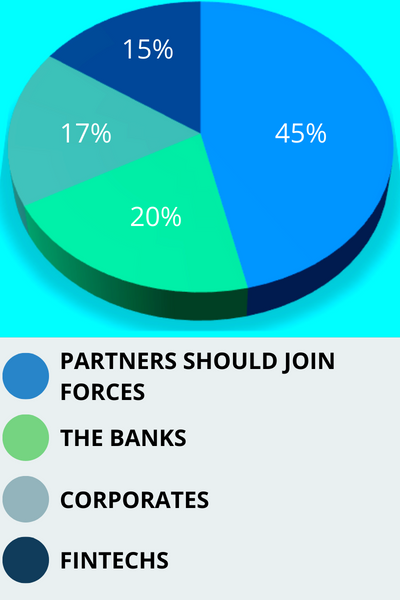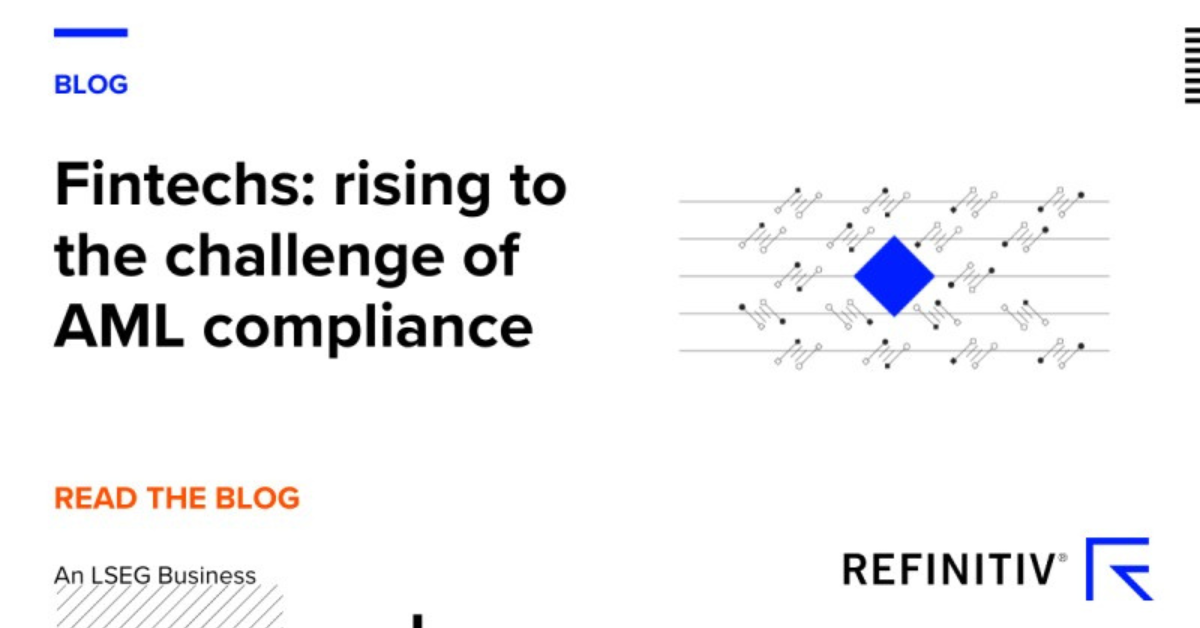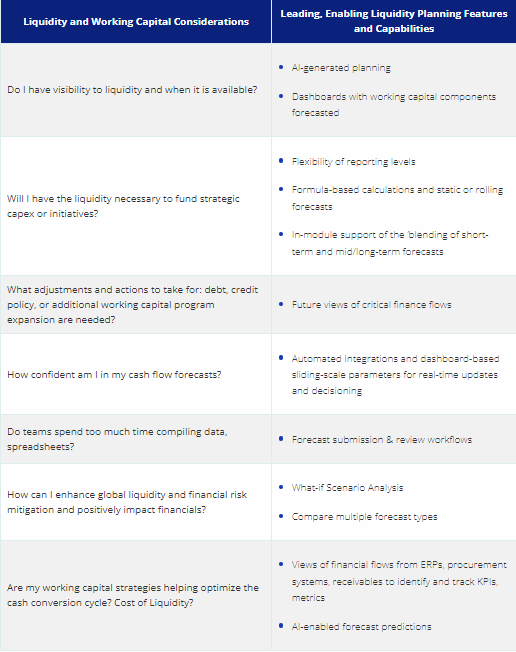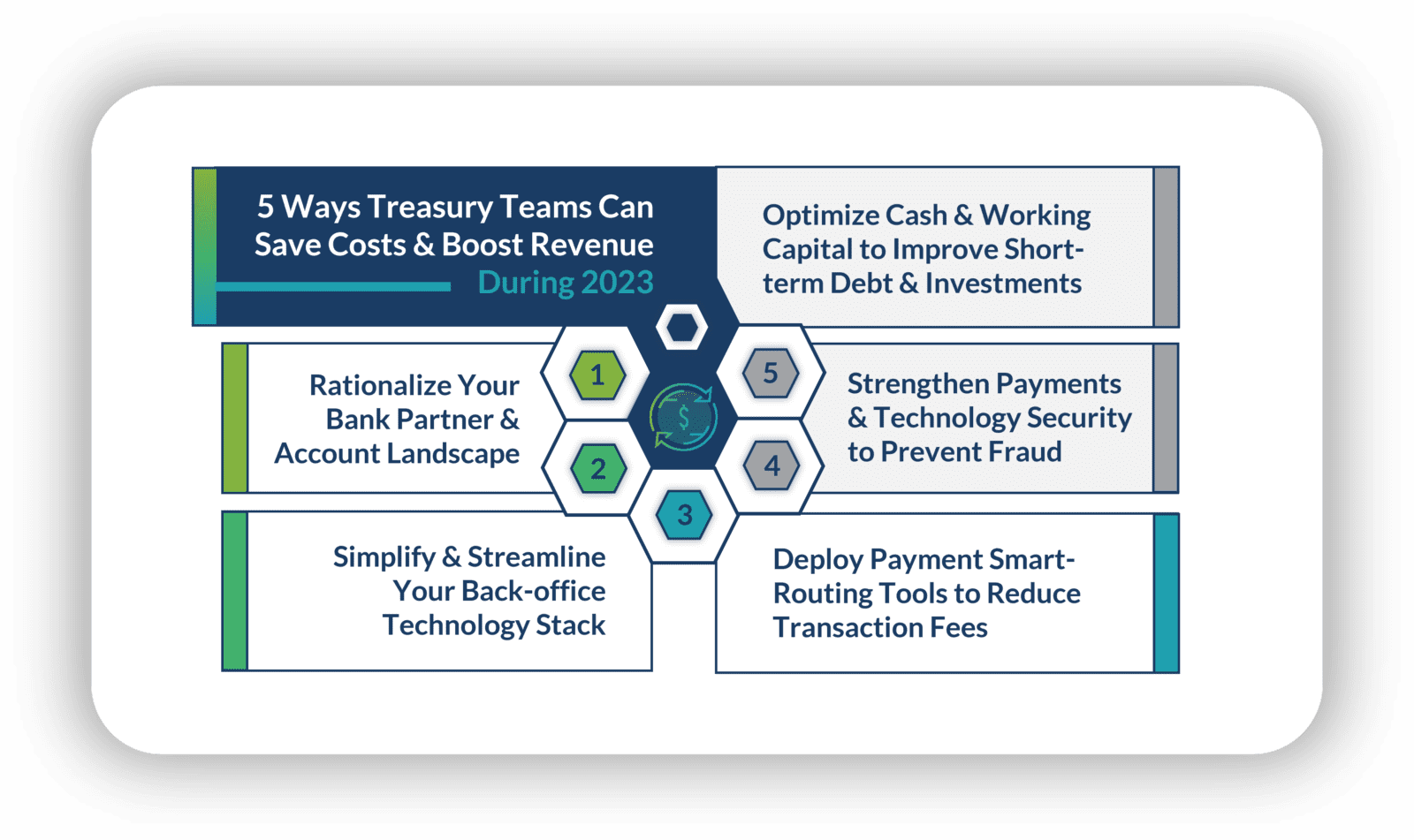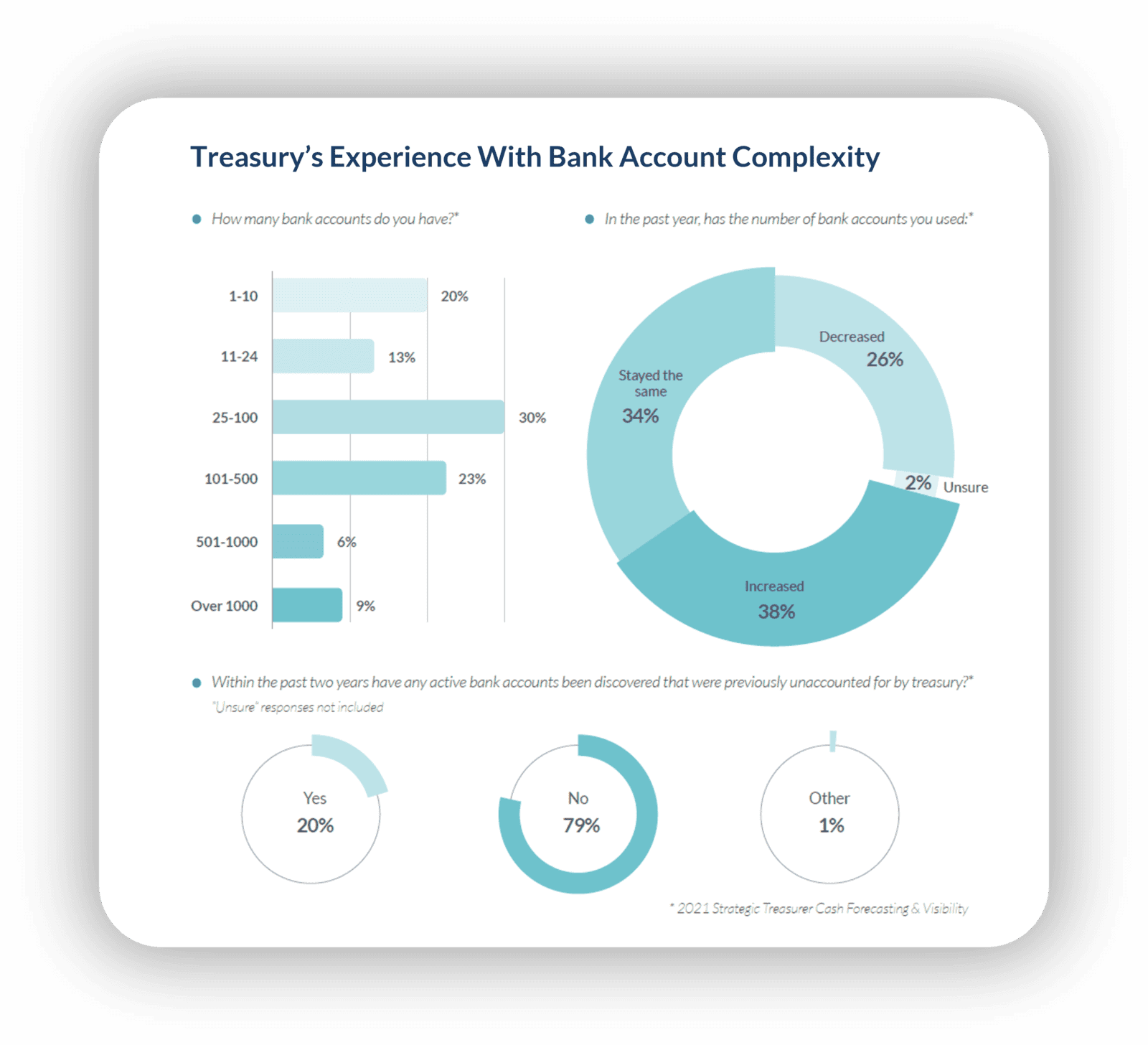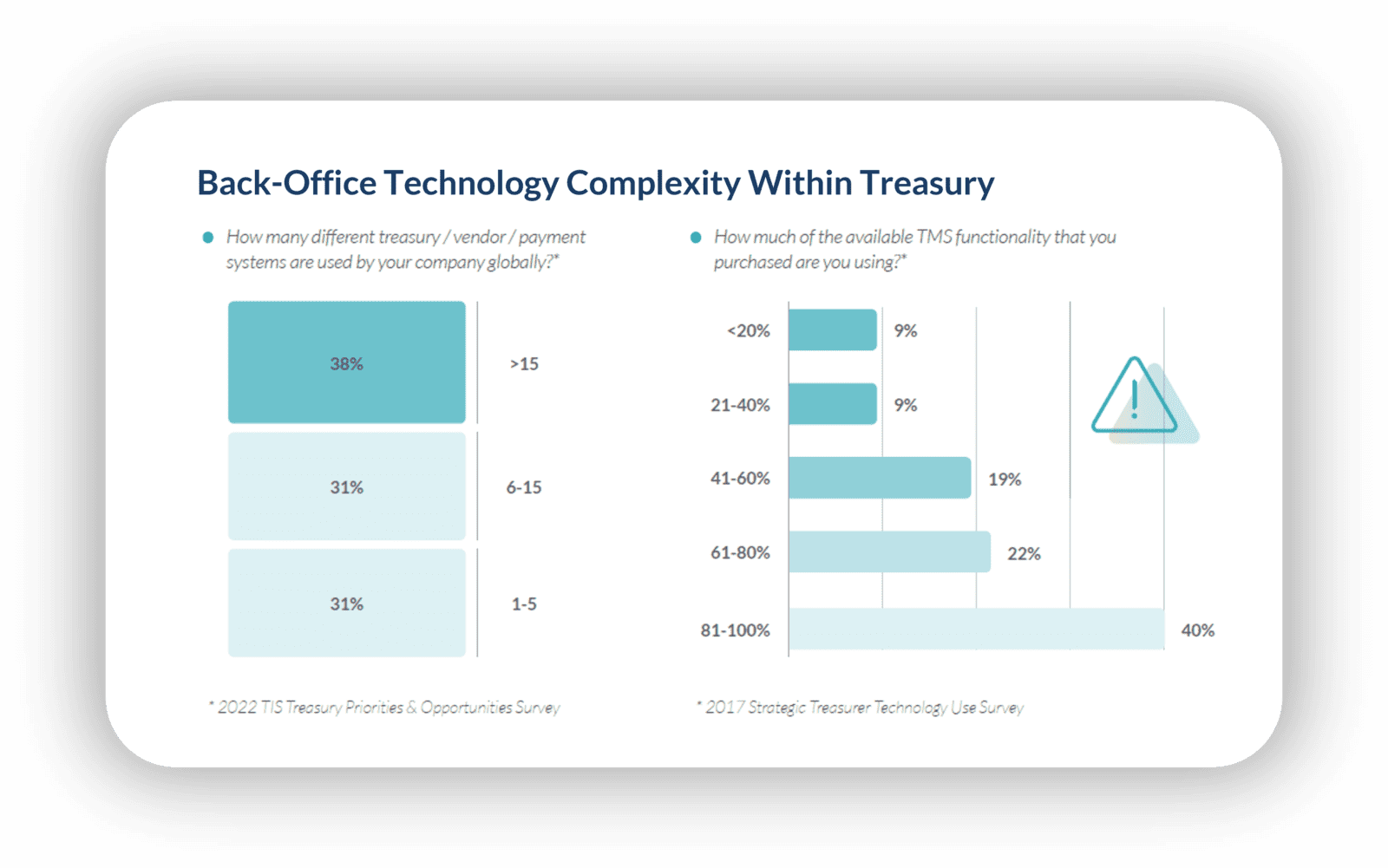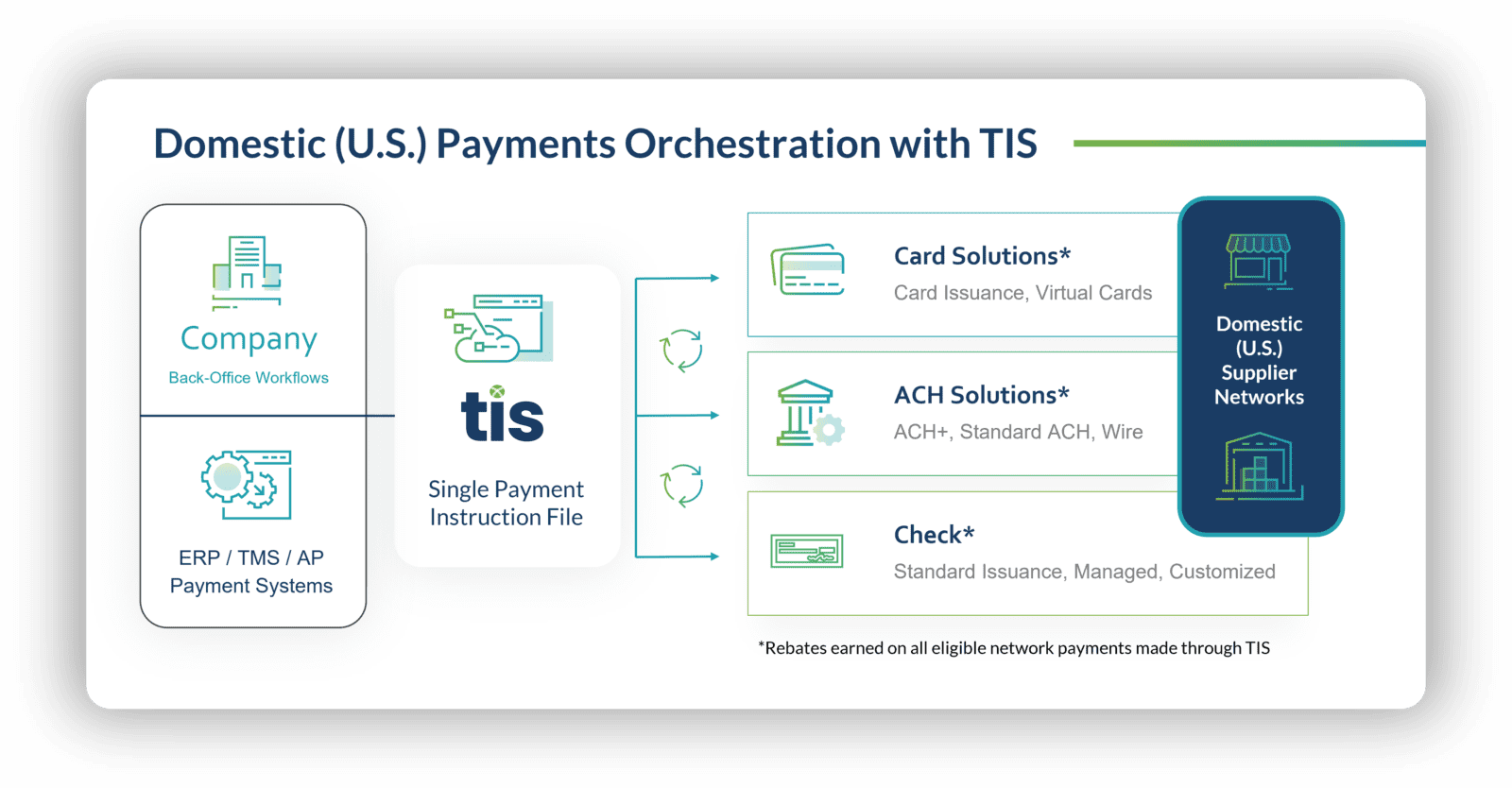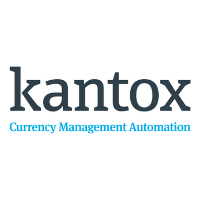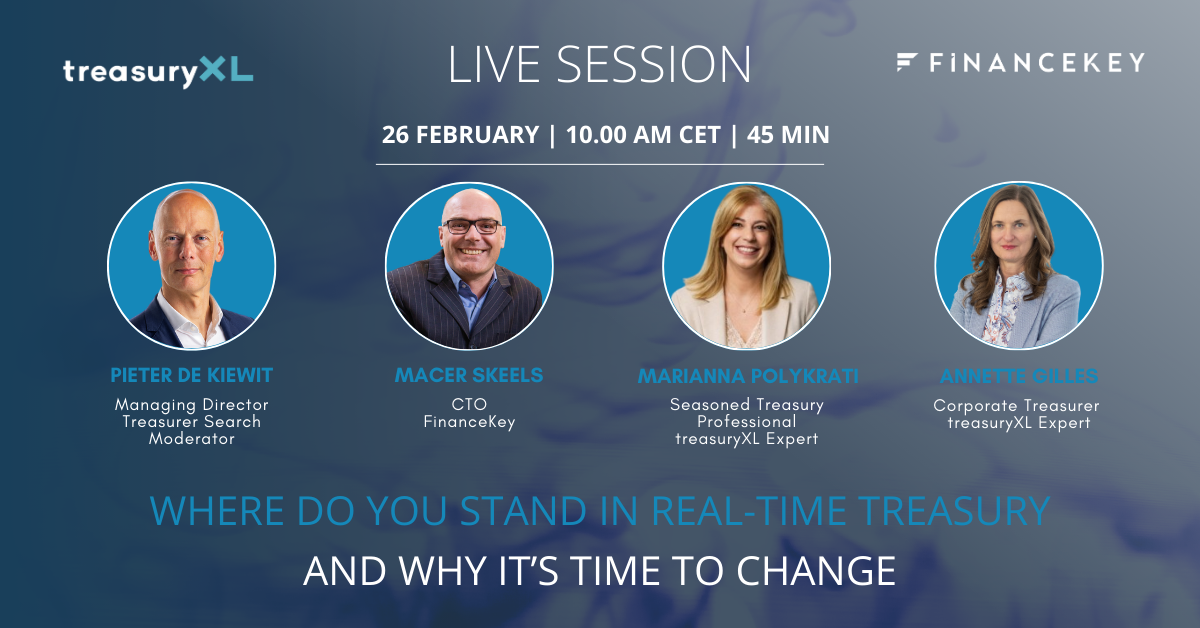05-01-2023 | Carlo de Meijer | treasuryXL | LinkedIn |
Turning back from our almost one month stay during November in South Africa, our beloved travel country, I was heavily chocked by the events on the crypto markets. During our stay I had promised my wife not to follow the news in these areas. But looking at internet I read the various articles and blogs on the FTX crypto exchange collapse and the negative reactions throughout the crypto space. These events will of course have their impact on the various trends in the blockchain and crypto markets in 2023 and beyond. So let us start.
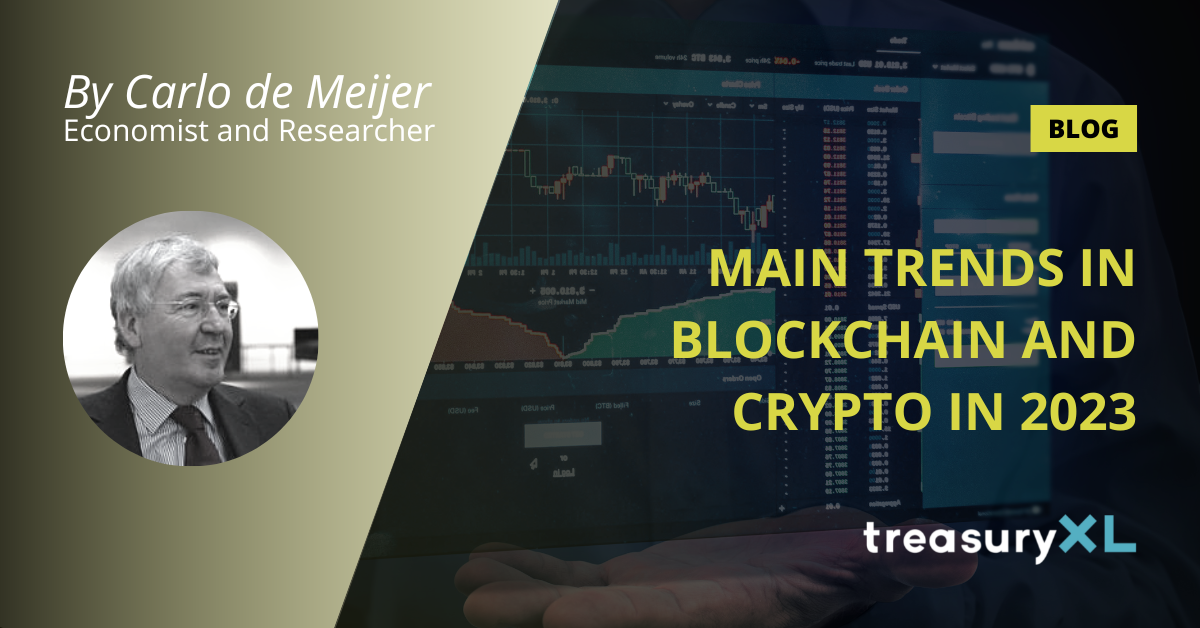
By Carlo de Meijer
1. The crypto markets will further undergo the impact of the recent FTX collapse
Meanwhile the shock waves of the collapse of one of the biggest crypto exchanges make it still feel throughout the whole crypto sector. It affected the credibility and trustworthiness of crypto as a reputational asset. It also brought the dangers inherent in the cryptocurrency space, cementing the vision of an insecure landscape and acts as a barrier to the growth of the industry.
This time trust has fallen to an all-time low greatly reducing the interest among retail investors as well as institutions and financial players alike in the crypto markets, causing many crypto currencies to fell sharply.
It also caused an increased number of crypto firms being crashed or confronted with liquidity problems, while other distressed companies could be entrained by the fall of FTX. As a result the total crypto market capitalization has dropped from $ 3 tn to $821 bn as of the end of November.
Expectations are for a new tough and volatile 2023 for many in the crypto industry. Investors remain much more reluctant to enter the crypto market as long as there is no clearness on crypto regulation. This will heavily restrict the sprawling crypto ecosystem known as decentralized finance (DeFi) as well as the NFT market, that were booming segments in recent years. As a result a growing number of crypto firms will get into trouble.
2. The collapse will pop up the quick introduction of stricter crypto regulation
Triggered by the events on the crypto markets, more stringent regulation will rise much sooner than later to prevent events like the FTX collapse and limit the misuses in the crypto markets. Regulatory authorities are now urgently working on stringent regulations of the largely unregulated crypto world. And that for various reasons. The FTX collapse underlines the risks and dangers of the unregulated crypto markets faced by consumers inherent in the crypto currency space. Given the crypto industry’s inability to self-regulate, it emphasized the need for tighter supervision and clear and more stringent regulatory frameworks. Regulators around the world will intensify their work in 2023 and come up with tougher rules for crypto companies. Aim is to meet the various risks and challenges of the crypto industry, including cryptocurrencies, crypto assets, stable coins, DeFi, NFT, lending and staking etc. but without frustrating or harming technology developments.
These rules should protect investors in crypto products and should ensure that crypto firms are more compliant and more transparent to act in a responsible way. Regulators should thereby look more closely at account balances and reserves at centralized crypto exchanges. This should ensure consumer protection, making crypto companies more transparent, while improving disclosures and risk awareness within the sector.
3. We will see the process towards an international regulatory framework
Regulators worldwide are expected to work more closely together to deliver a clear and effective global regulatory framework and supervision for crypto markets including crypto currencies to make crypto regulation effective. Without global coordination, even comprehensive local laws will do little to prevent cross-border regulatory arbitrage and the potential abuses. International institutions like BIS, IMF, G7, G20, the BIS, the World Bank and others are messaging that international regulatory collaboration and a cohesive regulatory framework is urgently needed. They are prepared to take the lead.
4. As well as earlier than expected introduction of CBDCs
These developments on the crypto markets will also trigger central banks worldwide to accelerate their process of developing and implementing their own CBDC. In 2022 we observed increased interest in the concept of CBDCs in a growing number of countries worldwide. More than half of central banks all over the world are now exploring their potential as they could offer several benefits. Most central banks thereby already moved beyond conceptual discussions and are either in the researching, testing or deploying stage of the process. There are already CBDCs that have gone live.
This process will further continue in 2023 when we will see a growing number of CBDC projects, triggered by the recent developments in the crypto market. This will also initiate more central banks an earlier than expected introduction of their own CBDC. Thereby there will be growing collaboration worldwide supported by international organisations like IMF, BIS etc. This may indicate another viable field for blockchain growth.
5. Technology innovations in the crypto market will continue to expand
It will not mean the end of the sector. Crypto markets such as DeFi and NFT may revive when new and more stringent regulation will have been implemented. Both the Defi and NFT markets are expected to further develop with the help of innovative developments, including tackling the main security issues.
a. The DeFi market will further innovate
We will see more technological innovations in the DeFi market, leading to more complex and interesting applications. These may include the creation of new digital assets and online payment systems, including utility tokens, digital shares, natural asset tokens, stablecoins, etc.
Next year will also likely bring more traction for use cases like self-custody wallets, synthetic assets, and prediction markets. And Improvements in the decentralized finance (DeFi) sector like the protocol Compound’s version (v)3 and the arrival of the zero-knowledge (ZK) ecosystem continued regardless. New infrastructural developments will continue such as the arrival of decentralized perpetual exchanges and regulatory-compliant platforms that connect traditional finance (TradFi) to DeFi.
b. The NFT market is expected to develop further technologically and creatively
NFTs, also known as non-fungible tokens, gained great popularity since 2021. In the past few years there has been a lot of talk about crypto games and crypto collectibles with the advent of NFTs. With this new asset class, there has been a shift in the way these assets can be used.
Though the recent crypto turmoil will cause minor interest – for the time being – this market is expected to develop further technologically and creatively. We will see industry disruption and ideas for utility NFTs such as in-game NFTs, identity tokens, and token-gated communities. Another trend is that the NFT market – previously only on the Ethereum platform – will increasingly be conducted in different chains. There will arrive a growing number of blockchain based platforms that allow players to trade their crypto assets on secondary markets.
c. We will the growth of interesting applications of tokenised assets
A new model around blockchain technology that will further emerge in 2023 and beyond is so-called asset tokenization. Tokenization thereby uses blockchain technology to turn digital or physical assets such as stocks, treasuries or corporate bonds into digital tokens. They are becoming increasingly popular, as smart contracts automate tokens transactions, while helping reducing and increase transparency.
We may see the growth of interesting applications of tokenised assets such as flash loans and real estate, while we will also see a surge of start-ups focused on bringing TradFi institutions into crypto in a regulatory-compliant way. Unlike crypto currencies, tokening makes assets easier to other people – both retail and business-users, to own that asset. It may open the present markets where trillions of dollars/euros are locked up in assets that cannot be deployed or to which there is extra ordinary limited access. Via asset tokenization anyone can invest in assets. People no longer need to go solely to the stock or cryptocurrency market.
6. The blockchain markets will further develop
But also in the blockchain area there will be a number of interesting trends that will determine the future development of the blockchain industry and how this technology is evolving in the coming years.
a. The blockchain markets will show further growth
Over the past few years, interest in blockchain technology has grown steadily and rapidly, with an increased adoption of the technology by finance and banks, governments, international trade and supply chain management, triggered by the various benefits it could deliver.
As a result the blockchain market is expected to further grow in 2023 and beyond. The spending on various blockchain solutions (market volume) is forecasted to increase to $ 23,3 bn in 2023 (from $ 12,2 bn in 2022).
b. Private blockchains are becoming popular
A trend that has started a few years ago and will further continue in 2023 is the growing adoption of enterprise or private blockchains. Enterprises are becoming more interested in private blockchains, because it permits only authorised users to access the network and take part in transactions. They require a key, sometimes called an invitation key from the owner. Private blockchains networks prove essential for safekeeping enterprise data. Access to certain documents and information is role-based and programmable to the authorised private blockchain based systems.
c. Blockchain will become mainstream
The adoption of blockchain-based systems is increasingly becoming the new standard across numerous industries. A growing number of Industries outside finance, are now searching for blockchain solutions. Thanks to blockchain’s ability to be used in almost any field, the trend will continue for years to come.
As the technology continues to evolve, more and more businesses are leveraging blockchain to streamline their operations. Blockchain is increasingly seen as an ideal for industries like finance, international trade, insurance, legal, logistics, supply chain management, healthcare, insurance, media and e-commerce where payments must be transparent, secure and efficient.
7. Blockchain infrastructure becomes more mature
The year 2023 will see a number of interesting developments showing the blockchain infrastructure is becoming more mature, including cloud services, DAO’s, interoperability and compatibility tools.
a. Blockchain as a service (BAAS)
While the cloud services industry is still young, their transaction growth is driving innovation. For business it makes it possible to use technology, software etc. without huge investment, to build their own infrastructure and acquire new skills. More broadly for cloud services, blockchain brings greater privacy and security capabilities. Currently start-ups and established companies of all sizes both use Blockchain as a Service (BAAS). It is now offered by numerous well-known organisations incl. Microsoft, IBM, Amazon etc.
During 2023 we will see a firm pick up of BAAS. It supports IOT applications by offering different blockchain-enabled services such as smart contract services, dApps, verification services or user information and cloud blockchain storage. Beyond these improvements to to-day’s cloud services, blockchain can be added as a service offering itself for secure network management.
b. DAO’s go mainstream
With the rise of blockchain technology, Decentralized Autonomous Organizations (DAOs) has grown in popularity and this trend will continue in 2023. Decentralisation is changing the way business is done, thereby helping to reduce costs while eliminating the need for intermediaries.
DAOs are new model for organizations that are managed and operated on decentralised networks and use blockchain technology to store and share information. These are automated entities that operate on rules encoded as smart contracts and have no single point of failures. They can exist and make decisions without any human management. DAO’s also give individuals more access to economic resources, by allowing them to invest their money into projects they find promising, without needed someone else to manage it. How DAOs can overcome incentive challenges, implement cross-chain asset management and interaction capabilities and expand use cases will be key for the next phase of its development.
c. We will also see cross-chain solutions to solve interoperability and compatibility issues
Protocols are entering the blockchain market that provide fast connectivity of different blockchains. Initially there were many protocols and platforms in this sector but there were no standards. For this reason, companies could not achieve compatibility across platforms at the same time. The main challenge was the usual transfer of data from one user to another without the ability to negotiate the terms. New protocols such as Polkadot, Cosmos, Wanchain and others are now providing fast connectivity of different blockchains with trouble-free interaction. In these solutions various cross-chains are connected to achieve interoperability and compatibility.
8. More blockchain innovations will enter the market
As blockchain technology further develops we will see more innovations entering the market, including dApps, smart contracts and new consensus mechanisms.
a. Firm uptake of dApps
In 2023 we are going to witness a more massive adoption of Decentralized Applications or dApps. These are applications that run on a decentralized network and use blockchain technology to store and share data. As companies seek ways to increase efficiency and reduce costs, DApps are gaining popularity. Blockchain networks offer endless possibilities for dApps with peer-to-peer nodes and smart contracts. With dApps one can diminish censorship from centralised authorities and ensure privacy or dApps development flexibility. dApps do not experience downtime since they leverage decentralised computing and utilize open source licenses to lease or use. dApps are also crucial to accelerating WEB 3.0 integration.
b. Increasing popularity of smart contracts
Another trend we are going to see is the increasing popularity of smart contracts in a growing number of sectors. These are digital ones that are automatically executed after meeting several conditions. When certain conditions are met, agreements are instantly implemented by a blockchain allowing for proxy-free contracting without the need for intermediaries.
They are becoming increasingly popular, as smart contracts help reduce paperwork and manual processing, as well as eliminate the need for intermediaries. Due to smart contract mechanisms blockchain services are now available to companies that do not have the resources for several years of research and development of their blockchain system, allowing them to make their own self-executing contracts, protecting against unforeseen circumstances.
c. New consensus mechanisms entered the market
New methods of cryptography to verify transactions are entering the blockchain space such as Proof of Stake (POS), Proof of Authority (PoS) and Zero Knowledge.
Proof of Stake (PoS)
Newer protocols to reach consensus are focused on eliminating the problem of power consumption and become more eco-friendly. The Ethereum switch in 2022 from proof-of-work (PoW) to proof-of-stake (PoS), in an attempt to make their algorithm greener, reduced Ethereum’s energy usage by an incredible 99.9%, while speeding up data transfer and reducing fees. This trend is likely to be seen more in 2023 and beyond and is said to become the major topic. This will likely make blockchain an even more attractive solution for many companies.
Proof of Authority
Proof of Authority uses a large number of trusted and private networks in business. It has been introduced as a more energy-efficient alternative to PoS as less computational resources are needed. In proof-of-authority, machines earn the right to generate new blocks by passing a strict vetting process. These system moderators are preapproved participants who check blocks and transactions. The Proof-of-Authority model is scalable because it is based on a small number of block validators.
Zero knowledge protocols
Zero knowledge protocols may be one of the significant WEB 3.0 and blockchain solutions in the coming years. As the question of privacy comes to the forefront of the crypto industry, zero-knowledge technology has been particularly notable this year.
Zero knowledge technology can solve privacy and scalability issues for the newer layer 1 blockchain projects. Because blockchains are inherently transparent, this application is huge for the industry and allows many more interactions to take place on-chain in a private way. With ZK proofs, users are able to prove their identity on-chain without having to reveal sensitive data. ZK proofs are also extremely lightweight, making on-chain interactions much more scalable and efficient.
9. New identity, security, tracking and data analytic tools will further evolve
a. Blockchain-based identification management will further evolve
With the move to digital commerce and communication, the individual identity (id) – as mapped to digital websites – becomes increasingly important to control and authenticate. Present id techniques are flawed in quite a lot of methods. They are porous, operate in isolation and are prone to errors. Blockchain techniques however can solve these issues, and offer a single source to verify identity and assets. Digital verification processes have already been developed based on blockchain technology that covers the entire user journey.
The operations for blockchain identity management are wide ranging. Blockchain identification can even supply a kind of ‘self-sovereignty. This is mainly for providers in the DEFI system and other necessary services that require verification. With the entry of NFTs and Metaverse into the market, the issue of digital identity will continue to trade.
b. There will be increased focus on security audits
Another trend is the increased focus on security audits. Many cross-chain bridges have been launched with the focus on speed, this at the expense of disregarding security. Cross-chain bridges have as a result become a popular target for hackers. With the raise in security-related incidents, we anticipate that more projects will recognize the value of auditing going forward. It is essential for projects to undergo a comprehensive security audit, together with other methods such as using bug bounties (a monetary reward given to ethical hackers for successfully discovering and reporting a vulnerability or bug to the application’s developer) to improve a project’s security throughout its ongoing operations and development.
c. Tracking tools will continue to develop
But also tracking tools will continue to develop in the near future, and may add more capability to anti-money laundering investigations. On-chain data can benefit blockchain analytics and anti-money laundering investigations immensely. We are already starting to see a multitude of on-chain trading and analysis platforms and tools. Through the data aggregation of these tracking tools, users can discover information such as the location of their funds and determine whether their assets are connected to stolen funds.
d. Blockchain data analytics will get more priority
Rich and open-source data is one of the blockchain’s best features, as it allows for deep analysis of on-chain activity. Data reveals a massive amount about how blockchains are used, emerging trends, user behaviour, and on-chain money flows. Blockchain data is however still largely untapped. Leveraging this data in an efficient and responsible way is integral to the expansion of blockchain dApps and their use cases. In 2023 we will therefore see more blockchain analytics platforms entering the markets which will be critical for understanding on-chain analytics through wallet activity.
10. Blockchain technology will be used for other applications
On the macro level, we will see more advanced implementations between blockchain and other technologies such as Web 3.0, Metaverse and Artificial Intelligence (AI).
a. Increased involvement of blockchain technology in Web 3.0.
We also will see an increased involvement of blockchain technology in Web 3.0. Web 3.0 is the next generation of the World Wide Web, that will radically change of how people interact with each other, by putting them in control of their personal data. Web 3.0 also aims to provide a personalised browsing experience for each uses. 2023 may see a further move toward adoption of Web 3.0 technology including blockchain as many will start to realize that it has to offer plenty of benefits over traditional systems such as increased security and transparency, lower costs, faster transactions, and more efficient storage space.
By being built on top of decentralised technologies like blockchain, Web 3.0 will provide users with a way to interact without having their personal information known by central authorities. The other significant aspect of Web 3.0 is that transactions are going to be done via crypto users that will serve as tokens for identity verification purposes.
As blockchain-powered “trustless ecosystems” evolve into Web 3.0, they are becoming key to the creation and monetization of digital assest. Web 3.0 may thereby take many forms including decentralised social networks, play-to-earn video games they reward players with cryptographic tokens and NFT platforms.
b. Growing use of blockchain technology for developing Metaverse
Another new trend is the growing use of blockchain technology for developing a secure and extensive Metaverse. The Metaverse, a shared virtual world providing engaging experience, can be interacted with big users through their digital avatar, an electronic image or online representation of the user. The ideas of the Metaverse is increasingly becoming a reality, with numerous well known platforms attracting a sizeable user base. Due to its decentralised structure, blockchain development can provide frictionless and secure access to the Metaverse, free from cyber-security and trend issues and inadequate user authentication. In addition to privacy and security, blockchain also links the Metaverse to the crypto economy, making it an attractive investment for companies in 2023 and beyond.
c. Companies increasingly use the combination of AI and blockchain
Blockchain technology is increasingly used to help keep track with the rapid development of Artificial Technology (AI) solutions, which studies the data in the blockchain and predicts future events, that is happening right now. Companies are increasingly using the combination of AI and Blockchain technology to build powerful solutions and we see that accelerating in 2023 and beyond.
Using blockchain to store and distribute AI models will provide an advanced audit trail and enhance data security for AI development. With the help of AI and machine learning, blockchain networks will become even more secure and efficient. This will enable businesses and organizations to store and share data securely, automate processes, and reduce fraud. AI can also use Decentralized Applications (dApps) to automate processes, reduce expenses, and increase transparency.
The business world needs to pay attention to these trends
Blockchain technology continues to advance, and applications of blockchain are being presented every day. Blockchain is a rapidly developing technology with new standards and delivery models and with a wide range of opportunities. For businesses it is important to stay up-to-date with the latest developments in the blockchain and crypto field. There are a number of these blockchain trends which a business needs to pay attention to gain the maximum out of it.
These trends described in this blog will help aid companies and organizations use the technology to its full potential to improve and streamline their operations, reduce costs, increase efficiency and boost security.
Wish you all a happy 2023.
Economist and researcher

